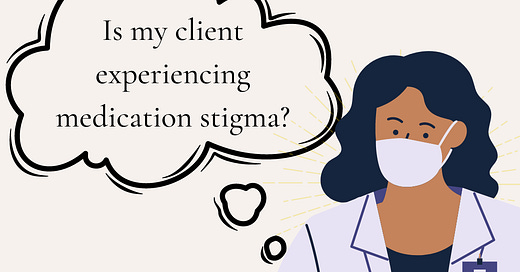Untangling Medication Stigma in Diabetes Care
Discover a few ideas help you reduce Medication Stigma, AKA pill shaming for people with diabetes. Remember to grab the patient care handout as well!
We have all had a client who wanted to stop a diabetes medication. Like you, one day, I was listening to Mary, who explained, "Now that I am cancer-free, I just want to get off all of the medications."
I nodded, knowing this strong woman had every reason to want to talk about polypharmacy. I asked if she had any specific concerns, “Cost or side effects?”
"No, I just don't like taking medication. I want to be healthy, and I don’t want any complications." My head bobbed in understanding as she shared her deeper desire. Health professionals know polypharmacy is a problem, especially in diabetes care. Even if it is an over-the-counter treatment, many medications impact blood sugar.
"I think I would be healthier if I didn't take medications."
In that one sentence, my whole understanding went poof! Something changed. I suspected she was verbalizing medication stigma, also known as pill shaming, and not concerned about polypharmacy.
Understanding how medication stigma is different from polypharmacy can help you and your patient come alongside the many questions about the medication management of diabetes care.
How Medication Stigma is Different yet Similar to Polypharmacy
Polypharmacy refers to using five or more medications. Reducing polypharmacy has many benefits, including:
Improving adherence because there are fewer medications to take
Reducing the financial costs associated with taking medication
Increasing the patient's medication knowledge through education
Increasing patient engagement in medication management
Decreasing the risk of adverse drug reactions1.
Diabetes places individuals at risk of having two or more chronic health conditions, specifically hypertension, kidney and heart disease. It means people with diabetes are likely to be prescribed multiple medications2 and many don’t understand why. Mary's desire to prevent being overprescribed medication makes sense until it gets conflated with the false belief that taking less medication makes her healthier.
As Mary's diabetes care and education specialist, I understand stigma is a big part of diabetes care. Yet, until recently, I was unaware of medication stigma, or what the internet calls pill and insulin shaming. Mary isn't my first client to express medication stigma.
What helps you identify medication stigma with your clients? Share your thoughts below in the comment section.
Here are some comments I have heard.
"I don't want to take insulin."
"I want to avoid taking another medication."
"I don't want to take medication because I won't be able to go off it."
"I stopped taking this medication because I felt better."
This 'less-is-best' belief is baked into diabetes care and reinforced when clients hear comments like these.
"If you change your diet, you can avoid taking medication."
"If you lose weight, you won't need medication."
"Most people can manage their blood sugar without medication."
Societal beliefs amplify the ignorance surrounding diabetes medication. The truth is that 77 percent of people in the United States3 with type 2 diabetes and 100 percent of people with type 1 take medication. Like you, I acknowledge this normal desire not to take medication if a reasonable lifestyle change can achieve the same outcome. I want to affirm my client's wish to save money, simplify their treatment, and have greater ease in their lives. Yet, the agreement can't provide the larger frame in which medication is prescribed. It is then, with the client’s permission, I ask to share an observation.
Keep reading with a 7-day free trial
Subscribe to Inclusive Diabetes Care Substack to keep reading this post and get 7 days of free access to the full post archives.





